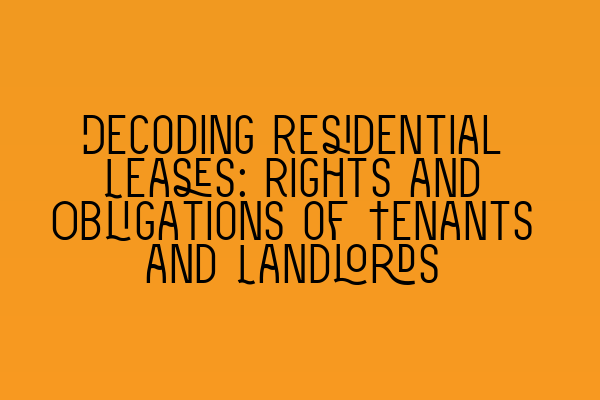Decoding Residential Leases: Rights and Obligations of Tenants and Landlords
Residential leases are essential legal agreements that define the rights and obligations of tenants and landlords. Understanding the key aspects of a residential lease is crucial for both parties involved. In this blog post, we will decode residential leases, exploring the rights and obligations of tenants and landlords.
1. The Basics of a Residential Lease
A residential lease is a contractual agreement between a tenant and a landlord that grants the tenant the right to occupy a property for a specified period. The lease outlines the terms and conditions that govern the tenancy, including rent, duration, rules, and responsibilities.
When entering into a residential lease, it is crucial for both tenants and landlords to thoroughly read and understand the document. This will help avoid any potential misunderstandings or disputes in the future.
2. Rights and Obligations of Tenants
Tenants have several rights when entering into a residential lease:
- Right to Quiet Enjoyment: Tenants have the right to peacefully enjoy the property without interference from the landlord. This means landlords cannot enter the premises without proper notice or engage in activities that disrupt the tenant’s peaceful enjoyment of the property.
- Right to Habitability: Landlords are responsible for maintaining the property in a habitable condition, including basic amenities such as water, heat, and electricity. If there are issues or repairs needed, tenants have the right to request prompt maintenance.
- Right to Privacy: Tenants have the right to privacy within their rental unit. Landlords must obtain consent or provide proper notice before entering the property unless there is an emergency.
Tenants also have specific obligations under a residential lease:
- Paying Rent: Tenants are obligated to pay rent in accordance with the terms outlined in the lease agreement. Failure to pay rent may result in eviction.
- Maintaining Cleanliness: Tenants are responsible for keeping the rental unit clean and free from damage. This includes regular cleaning, disposing of trash properly, and reporting any damage promptly.
- Complying with Lease Terms: Tenants must adhere to the terms and conditions outlined in the lease agreement, including restrictions on subletting, pet policies, and noise regulations.
For a comprehensive understanding of tenant rights and obligations, SQE Property Law & Land Law provides detailed courses to help prepare for the SQE exams. Check out their SQE 1 Preparation Courses and SQE 2 Preparation Courses to enhance your knowledge.
3. Rights and Obligations of Landlords
Landlords also have certain rights and obligations under a residential lease:
- Right to Collect Rent: Landlords have the right to collect rent from tenants as specified in the lease agreement.
- Right to Property Condition: Landlords have the right to expect the rental unit to be returned in the same condition as when the lease began, minus reasonable wear and tear.
- Obligation to Maintain the Property: Landlords are responsible for ensuring the property meets basic habitation requirements, including necessary repairs, maintenance, and compliance with health and safety standards.
- Obligation to Return Security Deposit: Landlords must return the tenant’s security deposit within a specified timeframe and provide an itemized list of any deductions.
Final Thoughts
Understanding the rights and obligations of both tenants and landlords is crucial for a successful tenancy. By decoding residential leases, both parties can establish a mutually beneficial relationship and avoid potential conflicts.
If you’re preparing for the SQE exams, it’s essential to practice and test your knowledge. Check out SQE Property Law & Land Law’s SQE 1 Practice Exam Questions and SQE 1 Practice Mocks FLK1 FLK2 to enhance your understanding of property law concepts.
For more information about the SQE exams and upcoming dates, visit SRA SQE Exam Dates.
